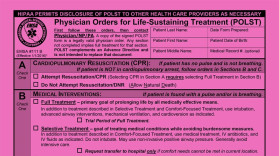Health Care Document Information
What is an Advance Directive?
An Advance Directive is legal document that names a decision-maker and outlines your general medical preferences. It must be signed by you and either two witnesses or a notary. It is not signed by a doctor. There are 2 sections:
1) Health Care Power of Attorney
This section is the minimum to fill out for a complete advance directive. Here is where you name a health care power of attorney (HCPOA) who would be contacted if you had a medical condition that prevented you from being able to communicate or make your own decisions. This is separate from a financial power of attorney who only handles matters of finances and property. Some might name a spouse, parent, or child as their HCPOA but you can also name a friend or signficiant other. Officially naming a HCPOA is particularly important when that person is not in your immediate family and/or when your family has strong differing opinions about approaches to medical care.
Before documenting your HCPOA, you should contact them to ask if they would be willing to step into the role of your decision-maker if needed. If they agree, you should keep them updated on your wishes as they may change over time. Remember, the key to your HCPOA being an effective advocate for you is the conversations about how you would like to receive care and what is important to you.
2) Living Will
This optional section is where you can indicate your health care wishes and preferences. This can be very helpful guidance to medical teams and your HCPOA. You might indicate a general approach to your health care, such as wanting to focus on comfort if you have a terminal or irreversible condition. Some people get very specific about their wishes around hydration, artificial nutrition, feeding tubes, ventilators/ life support, CPR, or organ donation. If your religious beliefs impact your medical decisions, this is the place to explain in detail.
Completing this section with a physician can ensure you have an accurate understanding of complex medical treatments that many people only see portrayed in TV shows and movies. With education specific to your health situation, you can make the most informed decisions.
Helpful facts about Advance Directives:
-- A person cannot complete one if they do not have mental capacity to make decisions
-- Anyone over 18 is encouraged to have one regardless of health condition
-- Signing witnesses cannot be the same as your HCPOAs
-- They do not expire
-- If a change is desired, you can complete a new one
-- It is not the same thing as "a DNR" (see POLST below)
Document completion can be confusing and overwhelming!
Contact me here if you'd like to be walked through
this process step-by-step.
What is a POLST (Physician Order for Life Sustaining Treatment) ?
Different than an Advance Directive which is a legal document, a POLST (also sometimes called "a DNR") is a medical document. It gets signed by either you or your decision-maker/HCPOA and a physician, nurse practitioner, or physician assistant. It is a powerful document that acts as an active medical order and must be honored by health care providers and medics.
The POLST is generally recommended for people who are of advanced age and/or have life-limiting illnesses. It specifically addresses the issue of whether or not to perform CPR if someone is in cardiopulmonary arrest (heart and breathing stops). If a patient and doctor decide together that performing CPR would cause the patient excessive suffering with minimal chance of returning to an acceptable quality of life, they might mark "Do Not Attempt Resuscitation" or "DNR".
If you have a POLST completed and change your mind, you can simply complete a new POLST with a provider and make sure your medical teams have an updated version.
Helpful facts about POLST forms:
-- It is the document some refer to as "a DNR"
-- Family members or HCPOA can sign for a patient who does not have capacity
-- They do not expire
-- If a change is desired, you can complete a new one
-- They are often kept in easy-to-find locations to be accessible to medics




